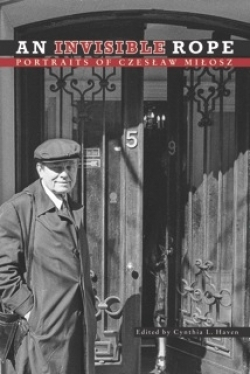An Invisible Rope
Portraits of Czeław Miłosz
“We inhabit a world where history doesn’t matter,” writes scholar Cynthia Haven in the introduction to this collection of biographical essays. “As a result, we lose the ability to think and learn from the past…we only fetishize culture—extol it without understanding it, memorialize it without being able to profit from it.”
Both Haven’s book and its subject, Nobel Laureate Czesław Miłosz, take a stand against such insidious tendencies. A survivor of the Warsaw uprising, diplomat and then defector from Communist Poland, exile in Berkeley, California, for forty years, and finally internationally recognized poet, Miłosz used his life and work to illuminate history and the human condition. He became a poet in Poland, in the former Soviet bloc, “where poetry was often the national substitute for public discourse and where it performed a historic function as well as an aesthetic one.” This dual poetic vocation animated his purpose but made him somewhat indigestible to the average American.
The thirty-two essays in The Invisible Rope help to remedy this by providing biographical context for Miłosz’s work through the perspectives of a varied group of poets, friends, scholars, and students. In particular, this collection limns the poet’s difficult years between defecting and winning the Nobel. Shunned by Polish nationalists, stuck in Paris without his family, then marooned in California without the close intellectual friendships of his home country, Miłosz was lonely. But he endured, working tirelessly to bring Polish literature to the attention of English-speaking audiences, and published his own work.
This collection is an invitation to explore not only Miłosz’s work, but the history and thought he sought to illuminate. An independent thinker, he placed himself between authoritarian regimes and traditional Polish nationalism, Poland and his native Lithuania, Europe and the US, and Catholicism and something less certain. A survivor, he believed in and inspired hope. To read these essays is to step into his several worlds and to reflect on the contradictions and poverties of this age and of American culture.
This is Haven’s second collection of essays about the poet and an important book for readers of history, poetry, and culture. Her project is to preserve memories of this icon, and perhaps his values as well. She succeeds in assembling a picture of Miłosz, prolific and determined, vigorous, omnivorous, and “the representative,” as contributor Peter Dale Scott puts it, “on earth of a whole firmament of brilliant solitaries.”
Reviewed by
Teresa Scollon
Disclosure: This article is not an endorsement, but a review. The publisher of this book provided free copies of the book to have their book reviewed by a professional reviewer. No fee was paid by the publisher for this review. Foreword Reviews only recommends books that we love. Foreword Magazine, Inc. is disclosing this in accordance with the Federal Trade Commission’s 16 CFR, Part 255.

